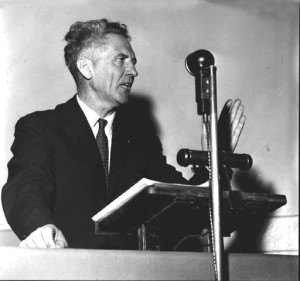The death of a giant June 3, 2009
Posted by Sverre in : Norwegian politics , comments closedOn May 25th a giant in Norwegian politics, passed away. Haakon Lie might not be very well known to foreginers, but he was certainly one of the most influential people in Norway in the 20th century. He was a man of many controversies, but it is hard not to respect his role in building social democracy in Norway.
 He was party secretary of the Labour party from 1945 to 1969, a period through which the Labour party was in government for most of the time. The joint leadership between Lie and the most prominent prime minister during the period, Einar Gerhardsen has become famous in Norwegian politics both for its effectiveness in building the country and for its latter days bitter rivalry.
He was party secretary of the Labour party from 1945 to 1969, a period through which the Labour party was in government for most of the time. The joint leadership between Lie and the most prominent prime minister during the period, Einar Gerhardsen has become famous in Norwegian politics both for its effectiveness in building the country and for its latter days bitter rivalry.
Lie was one of the people who rebuilt the Labour party from a party of class struggle to a broader mass party building the welfare state on a compromise between capitalism and socialism. He was one of the ideologers that formed a new kind of socialism where anti-capitalism was replaced by a modern social democratic quest for liberty for all. In domestic policy he pushed for social reforms along with his comrade in arms Gerhardsen.
In foreign and security policy he was much more controversial. He was driven by a distaste for communism whose anti-democratic tendencies he felt was a corruption of socialism. He feared its spread and favoured NATO membership and nuclear armament. (more…)
Controversial new NATO boss April 4, 2009
Posted by Sverre in : World politics , comments closedAP now reports that Danish PM Anders Fogh Rasmussen is confirmed as new NATO secretary general, despite strong opposition by Turkey. It was not an easy choice for NATO, and carries with it a number of issues.
Fogh Rasmussen is certainly controversial in many places. One of the big problems Turkey had with his candidature may be his involvement in the Mohammed caricature controversy, in which he supported Danish newspapers quite vehemently. He is also closely tied to former US president Bush and has been very supportive of the war in Iraq. This is understandably difficult for a Muslim country partially located in the Middle East.
Fogh Rasmussen, a right-liberal politician, has also been controversial domestically. In 1992 he had to resign from his post as Minister of Taxation preempting a vote of no confidence for misinforming the Danish parliament. He is also known for his adherence to the liberal ideal of the minimal state and a preference for low taxes. On the latter point he has been criticized for not doing enough, but he has implemented a “tax freeze”, promising at the least not to raise any Danish taxes. The most controversial of his policies is arguably his government’s hard-line stance on immigration, by many accused of bordering on the xenophobic.
Fogh Rasmussen has also made a name for himself as a strong EU supporter, and has reportedly been considered for several positions in the EU leadership. He has however run into many problems on home ground during his years in the Danish cabinet, with Danish rejection of the Maastricht Treaty, the Monetary Union and most recently opposition to the implementation of the Lisbon Treaty.
The biggest challenge for NATO is however likely to be that many leaders in the Muslim world still connect Denmark and Fogh Rasmussen with the controversy over the Mohammed charicatures – a connection that could now spill over more strongly to NATO, giving more fuel to Muslim leaders that benefit from portraying it as an anti-Muslim alliance.
South Ossetia: A challenge for the new world order. August 8, 2008
Posted by Sverre in : World politics , comments closed Numerous media sources inform us today about a Georgian offensive against South Ossetia, its separatist state. At first glance, it sounds like yet a minor border dispute in a forgotten corner of the world. But this is something more, bound to have an impact on geopolitics. For the South Ossetian sepraratists are under the protection of Russia, which reportedly have started bombing Georgian targets. And Georgia has since 2006 been on the path towards becoming a NATO member, having signed an “Individual Partnership Action Plan“, which has repeatedly raised russian protests.
Numerous media sources inform us today about a Georgian offensive against South Ossetia, its separatist state. At first glance, it sounds like yet a minor border dispute in a forgotten corner of the world. But this is something more, bound to have an impact on geopolitics. For the South Ossetian sepraratists are under the protection of Russia, which reportedly have started bombing Georgian targets. And Georgia has since 2006 been on the path towards becoming a NATO member, having signed an “Individual Partnership Action Plan“, which has repeatedly raised russian protests.
So what are the implications of Russia bombing a “near-NATO-member”? Is this a direct military challenge to NATO? Or have Georgia blown their chances for good relations with NATO by escalating aggression with South Ossetia? European commentators have barely woken from their sleep, and have yet to get to their keyboards and radio microphones to let us know what this all means. But all the ingredients of an international relations crisis seem to be there… (more…)